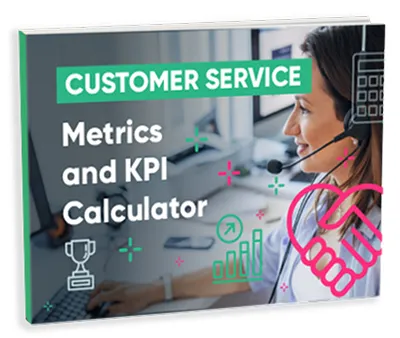Glossary
Average Handle Time (AHT)
What is Average Handle Time (AHT)?
Average Handle Time or AHT is a metric used in contact centers to measure the average duration of one transaction. It usually starts from the customer beginning the interaction and covers hold time, talk time, and any other related tasks during the conversation. Average Handle Time is a key factor when choosing contact center staffing tiers. The below illustration shows how to calculate AHT:
Additional Average Handle Time (AHT) Resources
- Hit the AHT Sweet Spot: Calculating average handle time is essential for call center optimization, evaluating agent performance, and ongoing training. However, just measuring AHT is not enough. Effective average handle time analysis requires companies to find the optimal balance between total number of calls to the center, number of calls handled per agent, and average handle time. When looking at the time an agent requires to solve customers problems, mapping all relevant metrics together allows companies to determine an area we call the AHT sweet spot—where the costs of doing business positively align to outcomes and drive desired customer behaviors.
- 5 Customer Experience Metrics to Track: Here are five key metrics to measure in order to optimize customer interactions and customer service: First Contact Resolution (FCR), Average Handle Time (AHT), Net Promoter Score (NPS), Customer Effort Score (CES), and customer satisfaction score (CSAT). Of course, tracking these metrics is just the start, but by keeping these key performance indicators top of mind, you can ensure your contact center operations team stays focused on agent training and improving amount of time they spend on a variety of call types, which in turn will help increase customer satisfaction and loyalty.

- Customer Service Metrics, KPIs, and AHT Calculator: Use this plug-and-play excel workbook of pre-made calculator templates to help your CX Leaders easily track key call center metrics. Learn how to calculate AHT, CSAT, NPS, FCR, and a whole lot more.
- 3 Steps to Optimize Contact Center Employee Performance: In many industries, high-performing contact center associates are critical to organizational success. These employees are often the front lines of your business and the voice of your organization answering customer calls and resolving customer issues. In this article, learn about AHT calculation, including how optimizing total talk time, total hold time, and after call work can improve overall contact center employee performance.
- Is it Time to Toss Average Handle Time in the Call Center?: While the AHT formula in bpo is still an important metric to track, strategies that just prioritize calculating average handle times fail to address the actual issue, which is how to properly coach center agents to ensure that customer’s expectations and needs are being met. In this article, learn how companies can rethink their approach to reduce AHT and improve customer resolution, including optimizing knowledge management and streamlining after call work.
- Omnichannel Contact Center Solutions: Optimize with Data Mapping: In this article, we'll explore the importance of data mapping and speech analytics within and across channels, including during call routing, to help lower phone call wait times, increase call center agent insights, and improve AHT. With better understanding of the full customer journey, you can provide more seamless experiences across all touchpoints, which improves customer experiences and operational KPIs.
- Contact Center Outsourcing Services: Outsourcing customer care and technical support is a cost effective way for brands to improve CX, accelerate digital transformation, and build operational efficiencies such as lower average hold time. Learn more in this overview article.
- Intelligent automation quickly improves average handle time: The combination of TTEC’s human experts and innovative technology created immediate results that reduced costs and improved customer experiences. After automating just four call-related processes, the company saw results immediately. Within four weeks, the client reduced the average time to complete the four selected processes by 59%. The optimization also had a positive impact on average handle time call center metrics, as aht decreased by 5.2% within 4 weeks.
- Average Handle Time Down 29% and Customer Satisfaction Up 36%: Our client was looking for a better way for their associates to handle their high-value customers. With our help they were able to get their associates better trained and more confident via improved knowledge bases. As a result, agents were able to improve call resolution, with average handle time going down 29% and customer satisfaction scores going up more than 36%.
- Contact Center Automation Tools and Trends: A successful call center automation strategy can help improve many contact center KPIs, including average handle time. For example, intelligent routing can help ensure customers spend less time waiting or repeating information, as they can be directed to the customer service agent best equipped to answer their questions right away. And for the center associates, time spent completing tedious and time-consuming tasks can be lowered via business process automation tolls such as RPA and RDA. In this blog post, we look at these, as well as several other, call center automation tools and trends that are shaping the decade ahead.
- Airline reduces Average Handle Time with Quality, Not Speed: We worked with team leads within the contact center to develop improved scripts and ensured that associates had access to them for use on every customer contact. Individuals who needed more training on product information were identified through a new center-wide knowledge assessment, and a supplementary training program was designed to drive the center to a higher level of proficiency.